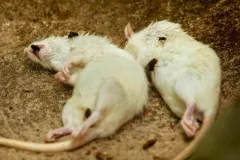Removing dead animals is no problem because this ain’t our first rodeo, we’ll restore your space quickly and safely!
That foul smell coming from your walls? It's more than just unpleasant - hidden dead animals in crawl spaces or attics can expose your family to dangerous bacteria and swarming pests. Most homeowners aren't equipped to safely handle these biohazards (or the maggot infestations that often follow).
That's why professional dead animal removal is so important. If you're in the Dallas-Fort Worth area, Austin, or Oklahoma City, our specialists safely eliminate carcasses and disinfect areas, protecting both your home's safety and your peace of mind."
